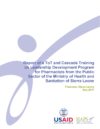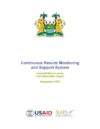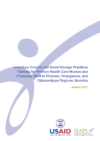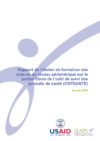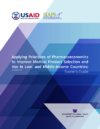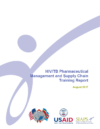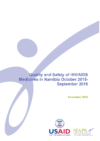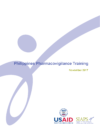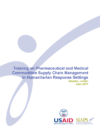The pharmaceutical sector in Sierra Leone faces several challenges. The Ministry of Health and Sanitation (MOHS), in collaboration with different partners, is in the process of strengthening the capacity of district and peripheral health facilities (hospitals and peripheral health units (PHUs)) to ensure an uninterrupted supply of essential medicines, manage supply chain activities through an … Read more
This is the report of the first continuous results monitoring and support system (CRMS) exercise in Bombali District, which was conducted in May 2016. The purpose of the report is to highlight the findings and observations of the CRMS exercise. A total of 104 health facilities (HFs) (one hospital, 18 community health centers (CHCs), 57 … Read more
Although SIAPS introduced a number of automated inventory control tools, such as the Facility Electronic Stock Card (FESC) and Electronic Dispensing Tool (EDT) for district hospitals, since June 2015, at the primary health care (PHC) level, inventory control and storage practice are a major challenge and the major cause of stock-out of medicines for antiretroviral … Read more
La formation des acteurs du niveau périphérique sur le portail Ebola de l’outil de suivi des produits de santé (OSPSANTE) a été réalisée du 18 au 22 septembre 2017 dans la salle de conférence du COU. Elle a réuni 40 acteurs au total : deux facilitateurs de SIAPS et trois du DOU-SP et 35 prestataires … Read more
Tools and materials are needed for pharmacoeconomic evaluation and health technology assessment (HTA) training to strengthen health systems and increase and support their capacity to perform HTA in resource-limited countries. Training on how to apply pharmacoeconomics to essential medicines selection should focus on equipping health care workers, regulatory authorities, public health program personnel, and academic … Read more
According to the World Health Organization, many countries spend 30–40% of their health care budgets on medicines and medical commodities, and a significant amount of the funds are wasted because of irrational medicines use and inefficiencies in stock management due to lack of skills. Other serious problems that health care organizations face include the overuse … Read more
This policy guidance document is divided into 13 different areas: Country policy development Registration Planning Financing Revised program guidelines, Essential Medicines List (EML), and reporting and recording forms Training of health workers and community partners (community health worker/relais) ACSM strategies Forecasting and quantification Procurement Distribution Health system strengthening Quality and safety Monitoring and evaluation
In the last five years, SIAPS has provided technical assistance to the Namibia Medicines Regulatory Council (NMRC) to strengthen its capacity for registration and quality testing by training technical staff in medicines dossier evaluation, developing guidelines for conducting the routine PMS of quality of medicines, and collecting medicine samples at selected ART and TB treatment sites … Read more
SIAPS conducted a training on pharmacovigilance (PV) to increase the capacity of the National Tuberculosis Program, the Lung Center of the Philippines, Pharmaceutical Division, and Food and Drug Administration. Strengthening the capacity of staff in these organizations and other stakeholders in this area of PV reinforces current safe scale-up efforts and introduction of these lifesaving … Read more
Most NGOs and partners who work with OFDA face significant challenges in pharmaceutical procurement and supply chain management (SCM) as well as difficulties complying with OFDA policies, procedures, and funding/donation requirements. OFDA seeks to ensure excellence in its operations and programs and continues to push for significant changes to establish a humanitarian aid system that … Read more
